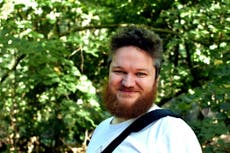When I found out I was conceived using donor sperm my life collapsed like a Jenga tower
‘It shakes things up. It really gets under your skin. It’s not something you get over,’ Laura Bridgens tells Maya Oppenheim


Laura Bridgens likens the experience of discovering that her biological father was a sperm donor to the moment a Jenga tower comes crashing down.
“I felt a whole world of emotions,” she tells The Independent. “In a lot of ways it made sense. But it was a massive, massive shock. I tend to liken it to a Jenga tower – someone removes the bottom block and it massively unsettles things.”
The 42-year-old, who lives in Cambridgeshire, has told of how she first learned she was a donor child after she asked her mother for an ancestry DNA test for Christmas. The request prompted her mother to reveal everything in February 2021.
Ms Bridgens is telling her story as new laws come into force in the UK meaning individuals born using an egg or sperm donor who turn 18 on Monday will be able to learn who their donor is.
A historic change was made to the law covering donor anonymity in 2005, meaning thousands of people born through egg and sperm donation will be able to trace their biological roots for the first time from this week.
But Ms Bridgens, who is director of Donor Conceived UK, believes the legislation does not go far enough. She is calling for UK laws to be reformed so the government is legally required to inform people conceived via donor, warning donors should never be allowed to be anonymous.
Recalling the shock of learning she was donor conceived, she recalled her mother coming to visit her on Christmas Day but not bringing the ancestry DNA kit she had asked for as a present.
“She gave me a pair of jeans as a present and said the DNA kit hasn't turned up,” she recounted. “We went into a hard lockdown and I didn't see her until February. She came to see me and handed me a letter and then proceeded to tell me what the letter said.”
Ms Bridgens, who works in property, said learning she was donor conceived “changes everything and nothing” at the same time.
“Everything looks slightly different now you know this,” she reflected. “It shakes things up. It really gets under your skin. It's not something you get over. It’s very much a lifelong situation.”

She explained she had managed to trace her biological father and track him down but warned the search was “hard” and “not particularly dignified”.
She added: “You are setting yourself up for some really difficult emotions – like rejection.”
Ms Bridgens said she has met her biological father’s family a few times and stayed in their house – explaining she is building a relationship with his children who are in their twenties.
“It’s still a weird existence,” she added. “Your existence is like a satellite in so many ways. You’re linked to them but then you are still very much a satellite part of it. You second guess most interactions – you are trying to be your best self, you are still trying to get them to like you.”
Addressing issues around laws on donor conception, she argued donor anonymity should be banned and called for the law to be “overhauled so the government has a legal responsibility to sensitively inform donor conceived people” about their biological origins.
She added: “It is in the best interests of donor conceived people to tell them, and then it’s their choice what they choose to do with that. It’s about donor conceived people holding the key to their own origins. It is understood to be quite fundamental to know where you’ve come from.
“It doesn’t sit well that the fertility industry and the government have decided we are not to know. There are so many people living without that information right now. You can’t exercise a right if you don’t know you’re entitled to it.”
But Ms Bridgens said the culture around telling children about donors was very different when she was young, with her parents being advised by doctors not to tell children.
Discussing the recent law changes coming into force, she said it was important to remember historical donors are not legally obliged to respond to a donor conceived person who gets in touch with them.
Initially around 30 young people who were conceived with the help of a donor will be entitled to request their biological parent’s full name, date of birth, and last known address – with the fertility regulator expecting hundreds of requests to follow in the coming years.
Recent data from the Human Fertilisation and Embryology Authority (HFEA) revealed some 766 young people will be able to request their donor’s details by the end of 2024, while around 11,427 people will be able to do so by 2030.
But Ms Bridgens argued that given “how donors were found in those days”, the address could be a student hall of residence.
She added: “The HFEA has done some eleventh-hour work, trying to encourage people to change their details but 18 years is a long time – these identifiable donors are no more prepared than any other historical donors. They’ve probably got their head in the sand.”
The UK’s fertility regulator has urged people who donated eggs, sperm or embryos after 1 April 2005 to make sure their contact details are up to date before members of the first eligible cohort – that is, children who turn 18 on Monday – can request the information, to “avoid disappointing their offspring”.
“Learning you are donor conceived creates a lot of questions without answers causing strain on mental health and wellbeing,” Ms Bridgens reflected. “There is no finality to your experience – you have the possibility of relatives popping up for the rest of your life.”
Join our commenting forum
Join thought-provoking conversations, follow other Independent readers and see their replies
Comments







Bookmark popover
Removed from bookmarks